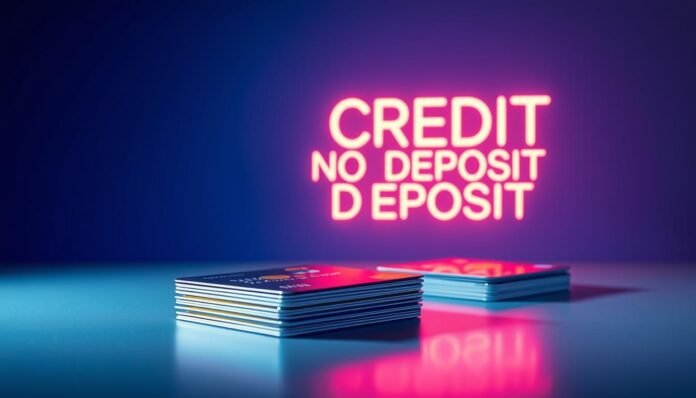In today’s financial landscape, the concept of free credit no deposit options has gained significant traction. These options empower individuals to access funds without the burden of an upfront cash payment. No deposit credit cards are a popular choice, allowing users to build their credit profiles while avoiding initial costs. In this guide, we will explore the various avenues available for obtaining unsecured credit cards, making it easier for you to embark on your credit journey with confidence and without financial strain.
Understanding Free Credit No Deposit Options
No deposit credit cards present a valuable opportunity for individuals seeking to enhance their financial flexibility without the burden of an upfront deposit. These cards allow users to access credit based on their credit history and other financial criteria. They cater to various needs, making them an attractive option for those aiming to build their credit profiles.
What Are No Deposit Credit Cards?
No deposit credit cards are specially designed to extend credit to users without requiring a cash deposit. The credit limit is generally determined by the issuer based on the applicant’s creditworthiness. This makes these cards particularly advantageous for people who have established credit histories or can demonstrate reliable income. Individuals looking to maximize their financial potential can use no deposit credit cards as a stepping stone for effective credit building.
The Benefits of Free Credit
The benefits of free credit extend beyond simple access to funds. Using no deposit credit cards can lead to improved credit scores when managed responsibly. By making timely payments, cardholders can positively affect their credit history. Furthermore, these cards often come with additional perks such as rewards programs and cashback offers, which further enhance the credit experience. For anyone considering their financial journey, the advantages of utilizing free credit options cannot be overstated.

Exploring Unsecured Credit Cards
Unsecured credit cards represent a popular choice for consumers looking to manage expenses without the need for a cash deposit. These cards function based on the applicant’s creditworthiness, meaning lenders assess individuals on their credit history and repayment abilities. This scenario allows for a diverse range of credit card options, making unsecured cards widely accessible.
What is an Unsecured Credit Card?
An unsecured credit card does not require any upfront cash deposit for approval. The lender assumes the risk by evaluating your credit score and overall financial behavior. These cards come in various forms, offering features like rewards programs and varying spending limits. Since they do not require a deposit, they cater to a broader demographic, making them a practical choice for individuals who have developed a good credit history.
Benefits of Choosing Unsecured Cards
The benefits of unsecured cards are numerous. First, they provide users with immediate access to credit without tying up cash in a deposit. This accessibility allows for flexible spending, whether for everyday purchases or larger expenses. Additionally, many unsecured cards offer rewards and cashback options, enhancing their value. Building a strong credit profile is another advantage, as timely payments on unsecured cards can positively impact your credit score, paving the way for better financial opportunities in the future.
Student Credit Cards as a Solution
For many young adults beginning their financial journeys, student credit cards provide a practical option. These cards cater specifically to students, often allowing them to establish credit while managing their finances. Understanding the eligibility for student cards is the first step to unlocking their benefits.
Eligibility Requirements for Student Cards
To qualify for student credit cards, individuals typically need to be at least 18 years old and enrolled in an accredited college or university. Many issuers have streamlined their requirements, meaning first-time applicants often do not need a lengthy credit history, making it easier for students to apply. This accessibility offers newcomers the opportunity to build their credit from the ground up.
Benefits of Student Credit Cards
The benefits of student cards extend beyond eligibility. These cards often come with lower interest rates, rewards programs, and tools designed to help students manage their spending. Additionally, responsible use of a student credit card can significantly enhance a student’s credit score, providing valuable experience in financial management. Embracing this financial tool can lay a solid foundation for future financial endeavors.
Alternative Options: Authorized User Status
Considering authorized user status can provide a path to building credit without the requirements of applying for a card independently. This option opens up numerous benefits for those who may have limited credit history or are just starting to build their credit profile.
Benefits of Being an Authorized User
Becoming an authorized user on an established credit card account has distinct advantages. You can gain access to the credit history attached to that account, which can positively affect your credit score, provided the primary cardholder manages their account responsibly. Regular and timely payments made by the cardholder may contribute to improving your credit score, adding to the benefits of being an authorized user.
How to Choose the Right Cardholder to Add You
Choosing a cardholder is a pivotal step when seeking authorized user status. Look for someone with a strong credit history and relatively low credit utilization. Their responsible credit habits can significantly amplify the benefits of being an authorized user. Open discussions about their credit practices and the terms of the card will help ensure everyone benefits from this arrangement.
How to Qualify for Credit Cards Without a Deposit
Qualifying for credit cards without a deposit can seem daunting, yet understanding the requirements and best practices plays a crucial role in the process. Credit card issuers evaluate various factors influencing credit approval to determine eligibility for applicants. A positive credit score, stable income, and reliable credit history become essential when aiming for approval.
Key Factors That Influence Approval
When applying for credit, several critical components come into play. Credit score stands out as one of the primary elements. Lenders typically favor applicants with higher scores, as these numbers represent a history of maintaining good credit. Additionally, demonstrating income stability reassures issuers that you can meet your payment obligations. Having accurate financial records that align with good credit habits can enhance your chances to qualify for credit cards without deposit.
Best Practices for Maintaining Good Credit
Successfully maintaining good credit involves consistent and dedicated efforts. Regularly monitoring credit reports for errors helps ensure that your financial standing is both accurate and favorable. Paying bills on time and keeping credit utilization low are also vital practices. By focusing on these habits, you solidify your financial foundation, making it more likely to achieve approval for the cards you desire.
Tips for Building Your Credit History
Establishing a solid credit history is essential for achieving financial goals. By focusing on specific areas, individuals can enhance their credit profiles significantly. Here are valuable tips for building credit history that can pave the way for better financial opportunities.
Making Timely Payments
Consistent, on-time payments are critical for establishing a good credit history. Payment history constitutes a significant portion of your credit score, making timely payments an essential habit. Setting up automatic payments can help ensure that due dates are met, ultimately leading to improved credit outcomes.
Keeping Your Credit Utilization Low
Maintaining a low credit utilization rate demonstrates responsible credit management. Aim to use no more than 30% of your available credit. This practice not only favors your credit score but also shows lenders that you can manage credit wisely.
Regularly Monitoring Your Credit Report
Regularly monitoring your credit report can help you identify any discrepancies quickly. Staying informed about your credit status allows you to address any issues that may arise and ensures that you are aware of any factors affecting your creditworthiness. This proactive approach is among the best tips for building credit history.
Understanding Secured Credit Cards
Secured credit cards serve as a valuable tool for individuals looking to build or repair their credit scores. Understanding secured cards involves knowing their structure and how they differ from traditional credit options. Generally, these cards require a cash deposit that acts as collateral, which sets the initial credit limit. This deposit significantly reduces the lender’s risk while allowing cardholders to utilize credit responsibly.
What is a Secured Credit Card?
A secured credit card is designed for those who may struggle to qualify for an unsecured card. By requiring a deposit, typically equal to the credit limit, these cards are more accessible for individuals with limited credit histories. The primary goal of secured cards is to prove responsible financial behavior. As users demonstrate timely payments, they may eventually qualify for unsecured credit cards, expanding their financial options.
When to Consider Secured Cards
Considering secured credit cards can be beneficial when seeking to establish or rebuild credit. Individuals with poor credit or no credit history may find these cards particularly helpful. Secured cards offer the opportunity to improve credit scores while providing a means for everyday purchases. For those ready to take control of their financial future, understanding secured cards can lead to long-term benefits and access to better credit opportunities.
Steps to Take Before Applying for No Deposit Credit Cards
Preparing to apply for no deposit credit cards involves several proactive measures. Focus on improving your credit score, as this will significantly impact your likelihood of approval and the terms of the card. Start by examining your current financial situation and identify any debts that can be paid down. Timely bill payments play a crucial role in building a positive credit history, so prioritize these to enhance your score.
Reducing your credit utilization ratio is another effective way to strengthen your credit profile. Aim to keep your utilization below 30% of your total available credit. Engaging with credit monitoring services can offer insights into areas needing improvement, making it easier to create actionable steps before applying for no deposit credit options. Proactively managing these elements empowers you to secure better offers on credit cards.
Conclusion
The journey to securing free credit with no deposit required offers numerous exciting financial opportunities. Understanding the various free credit options available, including unsecured and secured credit cards, as well as beneficial pathways like student cards and authorized user status, is crucial. Each channel presents its own unique advantages, making it easier to manage finances while building credit history.
Adopting smart financial habits, such as timely payments and maintaining low credit utilization, is essential for anyone looking to reap the benefits of no deposit credit. By implementing these practices, individuals can enhance their credit profiles and enjoy greater access to valuable financing alternatives in the future. Remember, this summary of free credit options can be your roadmap to achieving financial stability and success.
With diligence and the right information, navigating the credit landscape becomes manageable. The more you learn and explore these options, the more equipped you are to maximize your financial potential without the constraints of deposit requirements. Your efforts today can lead to a brighter and more secure financial future tomorrow.
FAQ
What are no deposit credit cards?
No deposit credit cards are financial products that provide users access to credit without requiring any cash deposit. These cards typically have a predetermined credit limit based on the applicant’s creditworthiness, making them especially beneficial for individuals with established credit histories or proof of income.
How do unsecured credit cards work?
Unsecured credit cards do not require a cash deposit and solely rely on the user’s creditworthiness. This means the card issuer evaluates your credit history and ability to repay, allowing individuals to access a range of spending limits and potential rewards.
Who is eligible for student credit cards?
To qualify for a student credit card, applicants must generally be at least 18 years old and enrolled in a college or university. Most issuers make these cards accessible to new students without requiring an extensive credit history.
By becoming an authorized user on a responsible cardholder’s account, you can leverage their positive credit history to improve your own credit score. Many issuers report authorized user activity to credit bureaus, which can help enhance your credit profile.
What factors impact approval for no deposit credit cards?
Credit card issuers consider elements like credit score, income stability, and credit history when approving applications for no deposit cards. It’s essential for applicants to ensure their financial records accurately reflect good credit habits to improve their chances of approval.
Why are timely payments important for credit history?
Consistent, on-time payments significantly contribute to establishing a good credit history. Since payment history is a major component of your credit score, developing the habit of making timely payments is essential for improving your overall credit score.
What is a secured credit card?
Secured credit cards require a cash deposit that typically acts as collateral, which establishes the credit limit for the card. These cards reduce the lender’s risk but can limit initial access to credit. Users are encouraged to transition to unsecured options after demonstrating responsible card usage.
How can I improve my credit score before applying for a no deposit credit card?
Enhancing your credit score can be accomplished by paying down existing debts, making timely bill payments, and lowering credit utilization ratios. Using credit monitoring services can also help identify actionable changes needed to elevate your credit score.
More information please visit INCESTFLIXS.




